The Zombies and Argent
aka
Silver and the Dead
Albums
reviewed: Begin Here,
Singles, Odessey
and
Oracle,
Argent, Ring
of Hands, All
Together Now, In
Deep, Nexus, Encore,
Circus, Counterpoint.
The Zombies get a lot of good press these days as a "rediscovered"
band that made excellent music. In an age of happy British
Invasion pops songs and English R&B, the Zombies were
successful
with a different twist. They played moody jazz-pop,
frequently employing minor keys, fabulous breathy vocals from singer
Colin Blunstone, complex arrangements, and the smooth keyboard work
of Rod Argent. A series of these minor-key pop masterpieces
earned them initial success, but only temporarily. After a
hideously long dry period in the charts (about 2 years) in which they
moved towards a more ecstatic pop style, they recorded a final album
Odessey and Oracle, which is a luscious pop
masterpiece that
promptly sank like a rock. The group disbanded about the time
the album was finished, only to see "Time of the Season"
become a post mortem hit in America. All of this was
accomplished by a group that lacked a dominant soloist, and who were
quite frankly dorks. Their strength lies not only in the
songwriting skills of organist Rod Argent and bassist Chris White,
but also in their marvelous vocal arranging, being almost equal to
the Beatles in the latter. Vocalist Colin Blunstone has the
most beautiful breathy voice, which perfectly compliments the mood
generated by their minor-key, or atmospheric pop. Argent may
have the most fluid at his instrument, but Paul Atkinson's guitar
work is surprising sometimes, and Hugh Grundy was one of the most
intelligent users of him drum kit around. Their biggest
problem
seems to have been that they were too complex for success.
All
in all, the Zombies were a unique, respected pop group that met with
only intermittent success.
I wasn't
kidding about the dork thing either. Just take a
look at the cover of Begin
Here and
decide for yourself.
Personnel: Colin
Blunstone (vocals), Paul
Atkinson (guitar), Chris White (bass
and backing
vocals), Hugh Grundy (drums), Rod Argent
(keyboards
and backing vocals). Blunstone went on to
solo career. Argent later
led a prog-rock group named Argent, writing and producing with White.
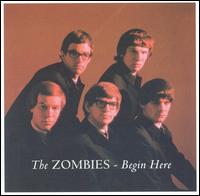 The
Zombies: Begin Here (Apr. 1965), ***
The
Zombies: Begin Here (Apr. 1965), ***
Like many period albums, Begin Here was built around a hit
single, in this case "She's Not There", and anything
else that happened to be lying around. The latter consists of
a
pile of R&B fodder ("Road Runner", "Sticks and
Stones", "I Got My Mojo Working", etc.), but also a
nice selection of the group's own work as well. Beyond the
band's two hits, Begin Here has a pair of brilliant
tracks
which feature the hit singles' cool texture (Gershwin's "Summertime",
"And I Remember When I Love Her"), and a pile of more
"normal" songs. Argent wrote the
majority of the material and only had a few bombs (the imitation
R&B
"Woman" and the Beatles rip-off "Sometimes"),
while White has a few solid tunes of his own ("I
Can't Make Up My Mind, "I Don't Want to Know", "What
More Can I Do"). When performing "Summertime"
and their own material, the band frequently sounds unique - creating
a sort of sultry sound (the interesting "The Way I Feel Inside"
which mostly Blunstone singing a capella).
The band's playing is fine - Argent gets in some nice work
periodically, Blunstone is great, even Atkinson's acoustic
12-string playing is more than adequate, and Grundy is a sadly
overlooked period drummer. Clearly R&B was not the
way to go for the Zombies, and
they needed to produce other sounds with more frequency. CD
reissues usually combine tracks released on an American self-titled
album, which include "Tell Her No" another terrific single similar to
"She's Not There." Produced by
Ken Jones. Many of the band's compositions were later
released
on singles, so a singles compilation might be a better buy.
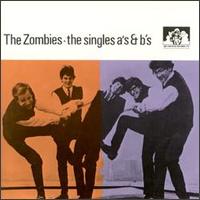 The
Zombies: Singles (1964-69), ****
The
Zombies: Singles (1964-69), ****
Thanks
to their newfound popularity, labels have concocted a ton of
Zombies compilations, and quite a few singles collections.
All
with with good
reason; like the Kinks, the Beatles and almost every other reasonably
pop-oriented band, singles were the way to go in the mid 60s, and
especially with the Zombies. After Begin Here, the
Zombies' label refused to let them record another album, so singles
were the band's
only outlet for a long string of pop gems - and subsequenly
the only place to find them. The
Zombies' singles show a band consistently focused on their own
compositions, frequently employing minor chords and near constant
themes of love and loss, and Blunstone's breathy vocals.
Beyond
their initial success with "She's Not There" and "Tell
Her No", the band followed the same course - churning out one
cleverly crafted piece after another from 1965-67 without commercial
success. On the whole, these songs are closer to their
earlier
sound than the vocally dominant, nearly guitar-less Odessey
and
Oracle. Sadly, nearly every single the band
released during
this dry spell (seven singles, all told) - is of
high quality
on both sides. Be they a song from an
obscure movie in
which the group appeared (White's swinging 3/4 "Remember You")
to a upbeat pop workout which morphs into a semi-psychedelic
instrumental ("Indication"). Finally, after the band jumped
to a new label (CBS) and started working on Odessey,
Decca put
a cover of "Goin' Out of My Head" as an A-Side, relegating
the far superior "She Does Everything For Me", in one final
attempt to take hold of the charts. "Time of the Season"
was actually the third single drawn from Odyessey -
both
"Friends of Mine" and "Care of Cell 44" flopped,
making that a stunning nine in a row. Some versions may have
a
US only single - "I Love You" b/w "I Remember When I
Loved Her". Argent and White also released some new
material after "Time of the Season" which is not
quite as good, such as "Imagine the Swan" and the throwaway
instrumental "Conversation Off Floral Street". There
was another US single in anticipation of the RIP
album ("If
It Don't Work Out" written by Argent for Dusty Springfield years
before), which may or may not be included in your compilation. The
bulk of the songs are gorgous, and a singles compilation is an
essential part of the Zombies experience. No matter which CD you
purchase, it will have a fair degree of overlap with both Begin
Here ("Woman", "What More Can I Do") and
Odessey and Oracle,
but pay no heed.
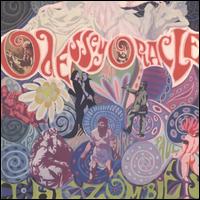 The
Zombies: Odessey and Oracle (Apr. 1968), *****
The
Zombies: Odessey and Oracle (Apr. 1968), *****
By
1968 the Zombies had evolved from a cool (in a non-evaluative sense)
minor-key pop outfit to a sonically beautiful one. Odessey
and Oracle is very vivid; a collection of
beautiful
atmospheric flares. The band was still using the same
romantically based lyrics as back in the early days, but both White
and Argent were far more poetical (the poignant piano-pop of "A
Rose for Emily"). Argent
and White also produced the album, and they did a fantastic job.
While certainly their own instruments are more distinct (White's bass
is actually prominent), like any true pop the real
focus is on
the vocals. Argent has more lead vocals than before, but no
matter who is singing the album has goddamn brilliant and vocal
arranging. The album was painted with a wide palate of
romantic moods, ranging from wistful ("Beechwood Park"), to
comforting ("This Will Be Our Year"), to outright joy ("I
Want Her She Wants Me", "Friends of Me"). They
had been listening to Beach Boys--an audible influence in the more
"daring" pop songs ("Care of Cell 44" - a love
letter to a girl in prison, the avant-pop of "Changes").
However, a distinct art-rock touch that crops up now and again, most
notably in some of Atkinson's guitar lines ("Beechwood Park"
and "Hung Up on a Dream"). Argent, always the
instrumental focus, also switched away from the organ indelibly
linked to earlier songs, opting for more piano and mellotron.
Odessey and Oracle
is
very much an album that conveys moods - usually atmospheric with
frequent mellotron use by Argent ("Brief Candles", "Care
of Cell 44"). However, a few songs are not as easily
palatable as the melodic pop. White's "Butcher's Tale"
is an initially off-putting anti-war tale set to Argent's cranky
organ, but the use of White's ragged vocals was a deliberate
statement -- a symbolic reminder amongst all the beauty, and (more
importantly) a good song. Otherwise "Changes" is also
pretty odd, alternating almost a capella sections
with more
normal verses, but it
is
marvelous after you get over the (relatively) steep
introduction curve. Ironically, "Time of the Season", the
only track retaining the Zombies' earlier minor key + organ sound,
became a massive non-UK hit after the group broke up. It is well
suited suited for this role as well, with a distinctive rhythm, the
"who's your daddy?" line, supurb harmonies. With this track
the band's transformation was complete, from dorky white guys in
person to indifferent to smooth pick-up artists. One of my all-time
favorite sing-along albums, because there are such a wide variety of
lines from which to choose, and every track is wonderful.
Note
that Argent and White seem to have been mixed the album with speakers
in mind, as opposed to headphones ("Changes" especially),
something which later appears in their work with Argent. And yes,
"Odessey" is an incorrect spelling. By the group's artist, not
me.
The
Zombies: R.I.P. (1968-69ish)
After
"Time of the Season" became a hit, Argent, White and some
others started to put together another album with new material, old
demos overdubbed and whoever was around. Blunstone may or may
not have been involved - most of the vocals are both Argent and
White, and whoever else they hired. It was never completed,
and
the material wound up either on little seen US singles trying to
follow the success of "Time of the Season", Blunstone solo
tracks, or went into the vaults. I have not seen a projected
track listing, but from what I've heard of this material it's even
more pop than their other work, with the band being subsumed by
strings, etc., and generally not as good as their earlier work (**1/2
to *** range). I believe the box set Zombie Heaven
has
all the relevant tracks (and then some).
Argent
Repeat after me,
Argent are not the Zombies. Again - Argent are not
the
Zombies. I know we'd all like them to be, but they
are a
vastly different band. Well, maybe not so vast starting
out.
Common wisdom has it that White and Argent took the harder side of
the Zombies and ran of to form a rock band, while Blunstone took the
pop side. I can't really dispute this, because I've never
heard
any of Blunstone's solo work. I only want to point out a few
things - a) Argent was certainly a rock band, but initially they were
one of the most melodic and poppish rock bands, before turning
elsewhere, and b) Blunstone's solo career involved a good deal of
work with not only Argent and White, but he was even backed by Argent
(the group) during some of his work. Returning to Argent,
they
later went toward a heavier/more progressive sound heard on songs
like "Hold Your Head Up" - a combination of a Ballard
simple rock lick with Argent's organ soloing. They remainder
of
their existence was spent trying to follow whatever was popular at
the time - turning to fusion, as well as anthemic hard rock. Ballard
wound up ditching them for a solo career in '74, and their next album
(Circus) was surprisingly good - especially for a
semi-wanky
concept album. But things were just downhill from there,
dissolving into a pastiche off every style the group had ever done by
the time Counterpoint came around.
Be
forewarned -
by an Act of Parliament, Russ Ballard is not allowed to be
photographed without sunglasses.
Personnel:
Rod
Argent (keyboards and lead vocals), Russ Ballard (guitar,
lead vocals, some piano), Bob Henrit (drums), Jim
Rodford (bass, vocals). Ballard
left after Encore
and was replaced by John Verity (lead vocals,
guitar) and John
Grimaldi (lead guitar). The band broke up after
Counterpoint, and both Henrit and
Rodford
eventually joined the Kinks.
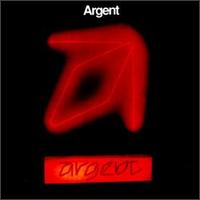 Argent
(1970), ***1/2
Argent
(1970), ***1/2
What
if the Zombies had soul? The fundamental difference
between Argent and
the Zombies is that Argent was very much a rock band, and the Zombies a pop band. While Argent's rhythm section is a
relatively harder and less complicated one than the Zombies', the
presence of Russ
Ballard on
guitar and co-lead vocals is a more fundamental
difference.
You see, Ballard had soul - providing a good foil to the lighter
tendencies of Chris White and Rod Argent's songwriting and
production. Seriously, Ballard's main contribution to the
album, the classic piano-ballad "Lonely Hard Road",
features lines like "Walking down this lonely hard road / Just
to be with my woman," and big vibrato vocals sometimes in
falsetto. However, with White and Rod doing most of the
writing, Argent does not fall too far from the
Zombie tree.
In some ways it is as if Odessey & Oracle never
happened,
with the exception of "Time of the Season", and the band
continued their organ-led pop. This album contains a pile of
pre-O&O sound-alike
songs with Rod on organ ("Be
Free", "The Feeling Is Inside" and "Freefall"
stand out), and even Ballard tries one ("Schoolgirl").
However, this lack of overwhelming change is partially due to the
fact that Ballard doesn't do much more than play chord riffs ("Be
Free"), and the rhythm section is rather low-key (where Grundy's
busy noise when you need it?). In other words, Argent lacked
a
strong instrumentalist other than its namesake, who admittedly is not
first-tier. Rod did dump the mellotron, and seems
particularly
classical minded whenever he cranks a solo ("Dance in the
Smoke", "The Feeling is Inside"), but the band was
cohesive enough that Rod does not need to carry the others.
As
for the whole soul thing, it does not overpower and is usually rather
appropriate. Still, you can see how something like the downright
gospel of "Bring You Joy" at least points towards others'
later excesses, while being a billion times better. Argent
and
White's production and arranging is fairly low-key compared to O&O
- there are only a few moments of inspired vocal harmonies (the a
capella hymn sections on "Freefall"), and a great deal of
empty space in songs (Ballard's "Liar" - later a hit for
Three Dog Night, and the underwritten "Dance in the Smoke").
Even though Argent were not the Zombies, Argent has
some gems
as well. This and all their subsequent albums were produced by Argent
and White.
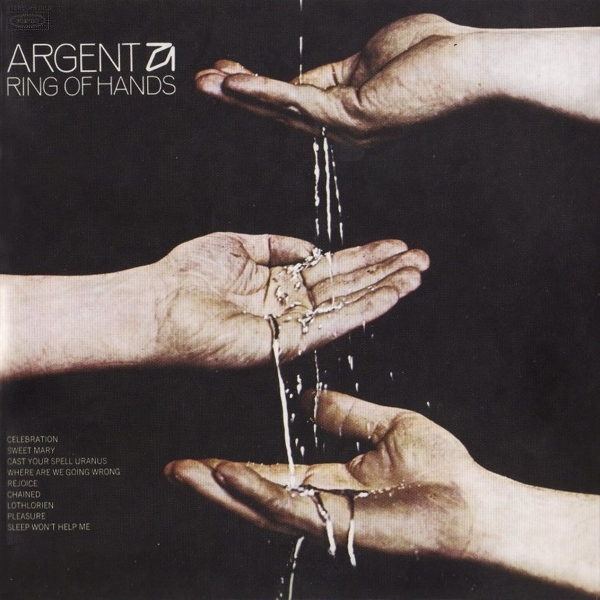 Ring
of Hands (1971), ****
Ring
of Hands (1971), ****
A
delightful transitional album, as the band mixes both prog-rock and
blues into good old piano-pop. It is not quite a freeform
mixture; generally, they imported good elements. So, while Ring
of Hands contains
more traditional piano-pop songs
("Celebration"), gentle drug-loving blues ("Sweet
Mary" which the BBC banned) and organ-driven prog epics
("Lothlorian"), there are some real mutations as well.
Argent/White's "Rejoyce" is a romantic piano-pop song with
a large chunk of New Testament references, bookended by Argent
playing something which sounds suspiciously like a classical quote on
grandiose church organ. Another example is Ballard's
excellent
"Cast Your Spell Uranus", which juxtaposes contemporary
seduction and mythology lyrically, while giving Argent's organ free
reign in large sections. (Assuming you can handle a song with
that ridiculous title.) Or, take those interesting Argent
harmonies, combine them with piano, some periodic bombast, and you
get, well, a strong precursor to Queen (or a piano-pop mutation par
excellence) on "Pleasure". Maybe you like the more
gruff, hard rocking side of the band--try "Chained".
It may recycle a rhyme from "Lonely Hard Road" (road/load),
but it avoids the trap of being another man-put-upon song through
innovative vocal harmonies. While the music is generally
hunky
dory, Ballard's role as a guitar player seems ill-defined. He
does play clever
little chord
patterns where possible ("Celebration"), and his distinct
slide work makes a good contrast to Argent's organ. On
Argent's pop songs Ballard is usually relegated to distant sideman
(the buried acoustic guitar on "Pleasure" and "Rejoyce"),
and his slide guitar is a poor fit for the overtly prog sections
("Lothlorian"), so sometimes
the band sounds like a less technical ELP.
Amidst all of this the rhythm section does an excellent job of
adapting to the changes in styles. Henrit and Rodford won't
be
mistaken for players in Yes
or most any real
prog-rock rhythm section, but they do a good job. Ring
of
Hands' most puzzling moments come from the band's blues
side.
"Sweet Mary" is fine enough, but why do a full-blown Cream
impression on "Sleep Won't Help Me" with Ballard imitating
Jack Bruce's voice and Clapton's guitar? The only serious
timewaster is Ballard's "Where Are We Going Wrong?" which
is appropriately placed at the end of the album, so the
discriminating listener can shut the music off right before it,
instead of listening to Ballard tread water. All in all, an
entertaining album that should have appealed to many, but apparently
did not. Still, this is the place where I would start with
the
band if you are not a Zombies fanatic, as it showcases the band
before they really shifted away from piano-pop.
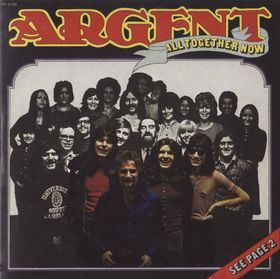 All
Together Now (1972), **1/2
All
Together Now (1972), **1/2
At
this point Argent began to look like they were just following the
latest trends with their mixture of mainstream rock and prog.
All Together Now is a strange mixture of
contemporary ideas
which never coalesce. Gone
are the piano-pop, interesting vocal harmonies, and group prog
sections. Tracks seem to be either shades of
hard rock
(Ballard) or shades of ELP (Argent),
even
though the White/Argent songwriting partnership again dominates the
record. The group's first hit, "Hold Your Head Up",
is a good example. In the edited single, the song is a rock
solid rock anthem, focused around the simple thumping of the rhythm
section, Ballard's neat little chord riff, and the title's
repetition. The album version belies the fact that Rod's
solos
has become increasingly twiddly, seen in a long middle
section.
There are also a pair of really disposable tracks - the empty, pompus
bombast of "I am the Dance of Ages", which dances in
circles and goes nowhere to a pounding Viking beat, and Ballard's
obnoxious, 50s influenced "He's a Dynamo." No, he is
not a dynamo. He is an annoying, annoying song. In
general, Ballard
has a larger role on All Together Now--he provided
many of the
lead vocals, and his guitar is louder and used more
frequently.
One of changes he pushed is that Argent sometimes gets ...funky.
Yes, funky. It only happens in a couple of songs - Ballard's
catchy guitar-powered "Tragedy" and White/Argent's more
rote "Be My Lover Be My Friend". Not an awful
decision, just unexpected, although both songs feature some annoying
vocal descants. Concurrently, maybe it was
the whole
"not charting any albums or singles" thing, but Rod decided
that piano-pop was out, and ELP was in. Oh, yes. So
now
we get a nice piano boogie with honky-tonk flourishes ("Keep On
Rollin'") and one of the most disconnected prog-rock suites I've
ever encountered ("Pure Love"). In this suite, after
a brief organ intro ("Fantasia"), Rod launches into a long
solo organ voluntary which sounds exactly like the sort of thing my
church organist used to play while the offering plate was being
passed. Intricate enough to demonstrate his skill, and keep
you
mildly interested before coughing up money. The main section
(actually called "Pure Love") is probably the best track
(or segment) on the album. After a good ELP-derived intro
(think "Stones
of Ages"),
the band launches right into Cream territory. You might have
thought "Sleep Won't Help Me" was just an oddity, but this
is the real deal. The song has a Cream-like mid-tempo and
heavy
sound, with Ballard playing an excellent slide guitar, and Rod
singing like a Jack Bruce withminus the nasal problems. This
is
the sort of thing that is just flabbergasting to find - a blues
hard-rock number buried alive in a progressive suite. All
told,
it manages to reflect both sides of the band - the more common hard
rock side and the prog-rock side - at their finest. The
ending
segment ("Finale") is just a scaled down version of
"Prelude" with the full band, incorporating one of the
motifs of the earlier part which Rod likely lifted from some
classical work. A stab at the mainstream market, and
moderately
successful artistically. It was very successful sales-wise, no doubt
propelled by "Hold Your Head Up", which made the Top Ten in
both the UK and the US.
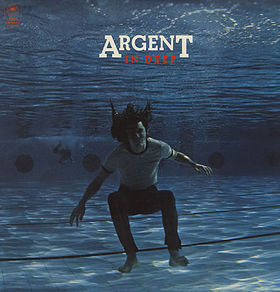 In
Deep (1973), ***
In
Deep (1973), ***
This
was the first Argent album I bought as a Zombies fan (it was the
first one I encountered) and I remember just hate, hate, hating
it.
"This doesn't sound like the Zombies at all!" I thought,
and promptly chucked it into the closet. Now three or four
years later, and with sufficient background knowledge, it does not
seem awful at all. In fact, as you've no doubt noticed, I
think
it's better than All Together Now, which is an odd
position to
take. In Deep is certainly not much
better, but enough
to make it slightly above average. Much like All
Together
Now was showcased "Hold Your Head Up", this
album opens up with Ballard's signature anthem "God Gave
Rock and Roll to You", which Kiss later
covered. This
song is surprisingly complicated given that it is an
anthem
(cue the lighters) and one about rock music. It has a nice
little prog intro, before Ballard comes on and introduces the main
tune with a characteristic guitar solo. The song's heart has
heavy emphasis on the third beat (1-2-3-4), and I
also have
this odd visualization of either female dancers or soldiers marching
along, raising their legs so that exactly when third beat gets that
extra emphasis the leg reaches the highest point, and then goes back
down. Not quite a leg kick, but you get the idea. Anyways,
the
song dies down and the band returns to their early sound for just a
moment - Ballard gets very quiet and quasi-classical-jazzy on guitar,
and there is a nice, brief dual vocal section between him and
Rod.
That is where the song should have ended, but then
the intro
is repeated, and you are stuck with another couple minutes of
repeating that same old chorus, rather pointlessly this time.
Which brings me to one of this record's big flaws: a great
deal
of needless ballast. In Deep was recorded
quickly, and
it shows in places. Both White's population paranoia "Candles
on the Water" and the A/W composition "Losing Hold"
are bloated wastes, and the latter's lyrics are direct precursors all
those horrid 80s pop clichés. Ballard's other attempt at
an anthem, the underwritten "It's Only Money Part One", is
the chief reason I initially hated In Deep.
At the same
time, the recording period might have helped the
album.
Argent/White's "Be Glad" sounds like a song which did not
make it onto Ring of Hands - a long, piano-pop and
prog
mixture about being happy. While "It's Only Money
Part One" is a single-minded bore, "It's Only Money Part
Two" is a completely different matter - an odd stylistic
conglomeration that marks a brief return to better song
arrangements. Watch out for the odd chorus-of-overdubbed-Rod
Argents-singing section, though. The song may have been an
afterthought (as the entire album is underwritten), but like old
Jupiter and Zeus, the offspring is greater than the parent.
Argent/White's "Christmas for the Free" is a pretty blatant
attempt to cash in on the holiday market. Whether by design
or
accident (Ballard became sick in the studio) it is a decent little
McCartney-esque piano tune, with at least one hook which catches me
off guard, and some "where is the peace?" lyrics. The
album's closing track, Ballard's "Rosie" is a toss-off
bar-room boogie certainly, but it's harmless, and resisting the urge
to shout "Rahoooooseee" along with the group is harder than
one might think. The album is only marginally better than All
Together Now, and is marked higher mainly because its lows are not as
low. Argent's last album before the band really started to go
awry.
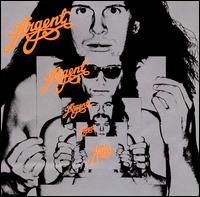 Nexus
(1974), **
Nexus
(1974), **
Below
average (well, that's what two stars means). The American
cover is a warning sign - a long haired, bare-chested, puffy sleeved
Rod Argent bathed in red light, welcoming you to his special
hell.
(What an odd choice for a cover - Rod Argent the nightmarish sex
symbol.) Musically, Nexus seals the
band's fate for good
as trend-followers, but respectable ones, as the music has real
substance, and the songs are more developed than In Deep.
Right from the opening moments, it is obvious that Rod has gotten
serious; that's right - Uh Oh, Love
Synths
Have Come to Town - and with quite a big sound. The first
three
tracks ("The Coming of Kohoutek", "Once Around the
Sun" and "Infinite Wanderer") are full-blown stabs at
instrumental prog-rock. Make that, disconnected, watered down
ELP-like and dated instrumental prog-rock. Even with those
qualifiers they are certainly worth a listen. Ballard's a bit
more involved with
Rod's prog tendencies then before, and his
presence
gives the band a distinct personality (the opening of "Once
Around the Sun"). Henrit gets points for trying, but
Rodford is really worthless here. Seeing as how he's Rod's
cousin, you have to hope nepotism did not overrule logic in the
lineup. The sad fact is that with the exception of Rod, these
guys pretty much pale in comparison to other prog-rock
groups.
But still, Nexus is tolerable, and while waiting,
and waiting,
and waiting, for the next ELP studio album to arrive, many fans
likely spun this and got a cheap fix. Far and away the best
track, "Music from the Spheres" is a much jazzier take on
prog-rock. Rod's quickly panned Rhodes electric piano sounds
like Max
Middleton
placed
among a rock group. The song's ending resembles a simpler
version of Yes's layering of sound. The electric piano does
date the song a bit, but I would listen to it in front of
others.
In between these is Ballard's "Love", a throwback to the
group's earlier Love and Joy days lyrically, but quite the product of
the times musically with electric piano, messy group chorus, and
earnest lyrics. Very sincere, rather nice, but glossy enough
to
be a 10cc song drained of all irony. Also, because Rod and
Chris liked to mix everything for speakers and not headphones, use of
the latter may nausea with the electric piano getting panned back and
forth a lot. You have been warned.
Listening to
the back side of Nexus is almost as treacherous as
walking
off-road in Angola. This is Ballard's domain, as he finally
placed a large quotient of songs on his last Argent album. I
did not peg him as the type, but he plows straight into contemporary
Deep Purple territory. Mind you, not the good Deep Purple;
this
is the post-Gillan Deep
Purple ("Gonna
Meet My Maker" - whose title says it all). Listening to
Ballard rip off Gillan's vocal style ("Thunder and Lightening")
is both funny and tragic. Or what about the odd, Robert Bolt
meets Bolero track "Man For All Reasons"? I mean,
jeez, I thought we were done with all the Bolero stuff years
ago.
Ballard's lyrics are often just lists ("Love" and "Man
For All Reasons"), a bit of an odd approach. Of course,
the lone Argent/White track ("Keeper of the Flame") on the
back side is a big blunder, as Rod put misplaced passion into "Dance
of Ages" like bombast. This is the Rod Argent of the cover
- bizarre, ominous, and overly-serious. The back's concert
photos are also a bit disturbing. Well, just the fact that
Rod
looks like he's not wearing any clothes at all, with his left hand up
behind his head, and his left reaching down in front of him, but with
the photo of Ballard blocking where his hand actually is.
Sure,
sure he must be playing his keyboard, but the
transformation
from Rod Argent - dork squad member, to Rod Argent - indecent
exposurer, is entertaining nonetheless. Thus, the nexus turns
out to be one between prog-rock and hard rock, with occasional
dissonance from the mixture. "Thunder and Lightening"
was released as a single in a pretty obvious ploy to pick up some of
Deep Purple's audience, but Epic records alone knows why "Man
for All Reasons" was also a single. Neither charted, nor did the album.
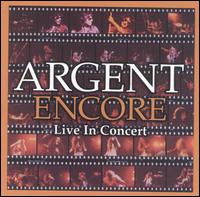 Encore
(1974), ***
Encore
(1974), ***
I
generally have little to say about live albums, and this is no
exception. Cherry-picked from three different nights, Encore
a double album, recorded while the band was touring behind Nexus.
Mainly they stick to anthems (both parts of "It's Only Money",
"God Gave Rock and Roll to You", "Hold Your Head Up"),
with Rod bringing in some prog pieces ("The Coming of Kohoutek"
which is reprised almost verbatim, "Music from the Spheres")
and the pompous ("Dance of Ages" and "Thunder and
Lightening" is just as annoying live, if not more so).
Ballard's "I Don't Believe in Miracles" is one of the few
lighter moments on the album, and had been a hit for Colin Blunstone
a couple of years before. Its inclusion is along the lines of
Nexus' "Love"--a nice little piano-based song, which
offers some relief compared to the rest of the album.
Although
the band does not reach back to their first two albums, they do close
with a version of "Time of the Season." Not as scary
as it might be, but this version does exaggerate the existing rhythm,
such that it becomes kind of ...funky. Not dastardly, just a
dated interpretation. Musically, there are few surprises -
Argent and Ballard have the same level of balance as their studio
albums would suggest, Henrit's not as exciting as I thought he might
be, and Rodford's a bit better (he even gets a spotlight on "Hold
Your Head Up"), so I take back any suggestions of unjustified
nepotism. Useless fact - the album was entirely mixed using
headphones. Ballard left around this point, and this is his
last appearance.
Circus
(1975), ***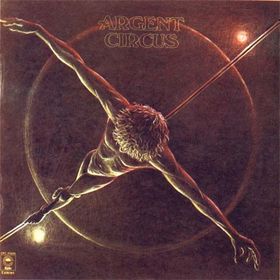
"Jumping the
shark" refers to when a show has crossed the final line of
taste.
The concept does not work with bands as well as it does for television
for various reasons
(likely sample size, trends move faster, etc), but if ever there
was a "jumping the shark" moment, on paper at least,
this would be it: the replacing of Ballard with two people (guitarist
John Grimaldi, and singer/guitarist John Verity), and then recording
a concept album. Better yet, a concept album about the
freaking
circus. Popular conceptions of the circus
are a petrie
dish full of clichés - the sad clown, jesters who have behind
the scenes power, tyrannical ringmasters, bearded ladies, and other
figures of this ilk. Recording a concept album about
the
circus is like giving a teenager matches and a gallon of gasoline -
all you can get is trouble.
Fortunately for
all involved, things worked out well. Much of this album
sounds
like the first side of Nexus blended - mixing the
overt
prog-rock of "The Coming of Kohotek" with the fusion sound
of "Music from the Spheres". Despite Ballard's
absence, the rhythm section retains some of their funkiness, which,
when combined with Argent's electric piano, gives sections a
pronounced Jeff
Beck feel.
Thus, Circus is very much a mid 1970s album, with
funky beats,
phasing, echoed guitar and the like ("Circus").
However, Rod Argent is still Rod Argent, and as
the music veers between prog and fusion, he
retained
his distinctive touches, like frequent background mellotron
("Highwire", "Flying Trapeze"). Speaking of
Beck, new kid John Grimaldi has a few flashy moves of his own,
sounding a bit like a proto-shredder (the 7/8 section of
"Highwire"). It is easy to see why Rod was excited to
keep the band going, but he drastically misuses Grimaldi as
ornamentation for most of the album. Verity's role is even
more
uncertain - Rod sings all the lead vocals, except for Jim Rodford's
"Flying Trapeze", where the author might be singing.
Rodford kicks up a nice bassline for what was likely his songwriting
debut, and his lyrics, although simplistic ("Flying high /
Turning in space / Indecision / Faltering grace") are effective.
Rod returned to
his piano-pop ways as well, coaxing backing vocals from the
gents.
The catch is that both songs are slooowww. His
last gem,
"The Clown", is quite beautiful and heartfelt, although it
goes on too long and has a bothersome synth solo. Its lyrics
are markedly more poetic than those heard on Argent's previous few
albums, which may have been related to the fact that the shared
Argent/White songwriting agreement ceased and Rod started writing all
the band's material. While "The Clown" is stately,
"Shine on Sunshine" lacks its strength, and it veers off
into Obvious Stevie Wonder Imitation Land, both in vocals and
synths. Proof? Try these lyrics - "Shine on sunshine;
paint my life of grey; Shine on sunshine; weave your spell
always."
A happy little song about being in love, and then praising
sunshine.
Alas, like so many pretty things, it too is
empty-headed.
Circus
has only a couple of outright filler tracks (the annoying "The
Jester", and the brief pointless experimentalism of "The
Ring" which is what? electric piano harmonics?), but all the
tracks have a good portion of hot air to let out. So, if you
can tolerate some excesses and inherent mid-70s-ness the remainder is
pretty strong. In general, a nice album which failed to
chart.
Counterpoint
(1976), **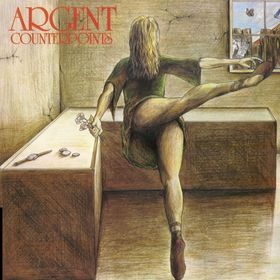
Last
stop, last stop! Everyone out at Counterpoint.
Watch your step, young man - it's a bit uneven. Why, now I warned you
at the last station that it was not pretty beyond. Out here,
it
gets pretty barren, pretty quick. This was last port of call
for Argent the band: not bad enough to rest in an unmarked grave, but
not good enough to get a nice tombstone.
Rod made one
final calculated move for commercial success with "On My Feet
Again", combining both of his previously successful styles.
Thus, the song's intro is a nice bit of piano-pop straight from
McCartney, before giving way to more of a hard rock sound, a la
Argent's 70s anthems. The track also makes clear why Verity
got
his job-- he sounds like Russ Ballard! Fortuitously, Henrit
was
ill and unable to record, and Phil Collins was
his replacement. Thus, their fusion instrumentals
are more
nimble than before, and Grimaldi really shines when let loose (his
"It's Fallin' Off" and Rod's "I Can't Remember, But
Yes"), although he does sometimes get so into his fast runs that
you wonder if he's in the same key as the rest of the band.
This is really the band's dominant strength at this point, and
Grimaldi was definitely a fret wizard. His own "Waiting
for the Yellow One", while nothing special, is a bit of a
throwback to earlier classically influenced rock, and might have
foreshadowed some interesting songs, had the group
survived.
Otherwise, Rod
does some last ditch impressions to keep the band afloat - Stevie
Wonder (the sickeningly saccharine "Butterfly"), and a
Ballard impression on "Rock and Roll Show", using Verity's
sound-alike vocals and slide guitar from Grimaldi. If you
thought Circus's piano-pop was slow wait until you
hear "The
Road Home", which features Rod slowly rambling about the past
for over seven minutes with his electric piano. Placed at the
record's end, it makes an excellent insomnia
cure. There
is no need to listen to Rodford's own seven+ minute track, which is a
slow, dark track with cryptic, vaguely revolutionary lyrics.
"Time" is what you will wish you had back after a listen.
In listening to Counterpoint, one understands why
Rod decided
to end the band at this point, especially as fusion was dying
out.
Unfortunately, Argent went out parroting both themselves and
others.
Produced by Argent and White, "in conjunction with Tony
Visconti," the longtime Bowie producer.
Is this
the dream you're crying for? Try the Music Page instead.
 The
Zombies: Begin Here (Apr. 1965), ***
The
Zombies: Begin Here (Apr. 1965), ***
 The
Zombies: Singles (1964-69),
The
Zombies: Singles (1964-69), The
Zombies: Odessey and Oracle (Apr. 1968), *****
The
Zombies: Odessey and Oracle (Apr. 1968), ***** Argent
(1970), ***1/2
Argent
(1970), ***1/2 Ring
of Hands (1971), ****
Ring
of Hands (1971), ****
 In
Deep (1973), ***
In
Deep (1973), *** Nexus
(1974), **
Nexus
(1974), ** Encore
(1974), ***
Encore
(1974), ***
